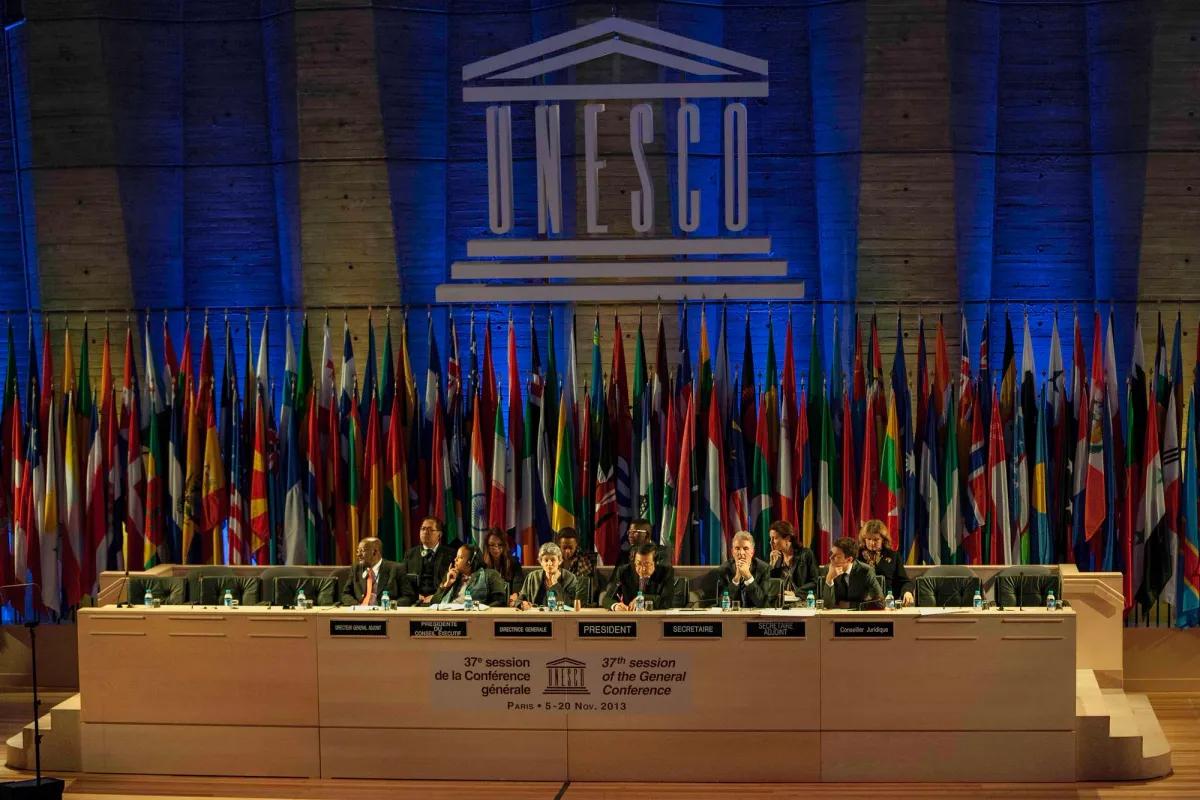The US is set to rejoin the United Nation’s Educational, Scientific and Cultural Organisation (Unesco) in July 2023, nearly six years after President Donald Trump committed to withdraw the US from the agency responsible for the protection of heritage sites across the world.
Audrey Azoulay, Unesco’s director general, announced the news to gathered representatives of the organisation’s 193 Member States today. Her speech was met with widespread applause.
The US will rejoin “on the basis of a concrete financing plan,” Azoulay said, which will now be submitted to the General Conference of Unesco Member States for their approval. The reintroduction of the US will therefore be dependent on a vote scheduled to take place next month.
Unesco, headquartered in Paris, is the governmental organisation for a host of international and multilateral cultural initiatives. Among these, Unesco oversees the World Heritage Committee, which is responsible for implementing the World Heritage Convention and protecting the 1,157 areas afforded World Heritage Sites status. Unesco also maintains formal relations with the International Council of Museums (Icom).
Richard Verma, the US deputy secretary of state for management and resources, submitted a letter last week to Azoulay, formalising the US government's plan to rejoin. The letter welcomed the way Unesco had “modernised its management and reduced political tensions”, a spokesperson for Azoulay said in a statement.
Reengagement with Unesco has been a long-held objective for President Biden’s administration as it seeks to rebuild alliances with international organisations.
The US signalled its intention to withdraw its membership of Unesco in 2017, primarily over political tensions relating to the ongoing conflict between Israel and Palestine.
But, after coming to power in January 2021, the Biden administration became concerned that, in the absence of the US, the Chinese government was exerting an undue and increasing influence on Unesco's policy agenda.
After the US withdrawal, China increased its contributions to Unesco to around $65m, becoming the largest contributor to the agency’s annual budget. In March 2018, Unesco appointed Xing Qu, a Chinese diplomat, as its deputy director general. Since then, 56 Chinese heritages sites have become protected by the the World Heritage Committee, making China the second most protected nation in the world, after Italy. China has also consistently blocked Taiwan’s attempts to become a member of Unesco.
Rejoining Unesco will be hailed by Biden as a hard-fought political and diplomatic victory. In December 2022, his administration managed to pass a $1.7tn federal spending bill through the US congress, with bipartisan support. The bill included a waiver that explicitly stated the US government would seek to re-engage with Unesco in order to “counter Chinese influence".
The bill allocated a sum of more than $600m that the US will pay Unesco in arrears. The US withheld its funding in the years prior to its full withdrawal in 2017. Repaying the backdated membership fees in full now allows the US to return as a full member without delay.
The news will come as a financial boon for Unesco, which has an annual operating budget of $534m. Before its withdrawal, the US contributed around $80m per year.
The US government’s relations with Unesco became strained in October 2011, when the agency’s members voted to admit Palestine as a full member. Palestine is a non-member observer state at the United Nations, but is not officially recognised by a number of major countries in the world, including the US.
The President Obama administration was lawfully required to withhold its funding to the UN organisation as a result of the vote, due to legislation passed by the US congress in 1990. It also began to withhold its voting rights within the organisation in 2013, arguing that Unesco’s recognition of the state of Palestine was a deviation from the UN’s requirement to remain neutral on all global conflicts.
The UN, by contrast, has refused to denounce Russia by name for its role in the war in Ukraine, although the organisation has published an exhaustive list of cultural sites that have been damaged as a result of the war.
In October 2017, the Trump administration took the further step of announcing its decision to leave Unesco entirely, before officially leaving the organisation in January 2019. Israel also left the organisation at the same time. President Trump said that Unesco betrayed an "anti-Israel atmosphere” arguing that the politicisation of the organisation meant it had deviated significantly from its core mission of promoting education, culture and scientific research.
Negotiations have since taken place with the Israeli government, who, in February 2022, said it would not oppose a US return to Unesco.
Writing in The Art Newspaper in December 2022, Anna Somers Cocks analysed how political activities within Unesco threatened certain heritage sites.
“Unesco has wandered from the principles underlying the World Heritage Convention of 1972 to protect [heritage] sites as a common good,” Somers Cocks wrote. “Member states have gradually been transforming what was a technical and professional approach into a political one, with alliances and secret deals to get sites accepted onto the World Heritage Site list and to avoid sanctions where a site is being mismanaged.”
The Trump administration also argued that the US shouldered a disproportionate burden in terms of Unesco funding, calling for greater financial responsibility and transparency.
“Administrative reforms, rolled out since 2018, have made UNESCO more efficient and financially sound,” Azoulay’s spokesperson said.
Azoulay was elected as the head of Unesco in November 2017. She has since led mediation negotiations with the US government “that made it possible to reduce political tensions and find consensus on the most sensitive topics, such as the Middle East,” the spokesperson said.


